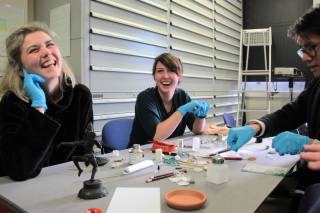The aim of this module is to provide students with a thorough knowledge of the theory and practice of collections management and care.

The management of collections is the foundation for many other museum activities. The module includes consideration of the acquisition and disposal of collections; museum documentation; stores and collections access; handling and examination of objects; the principles of conservation; and security and emergency planning.
Aims
Having taken the course students should understand why collections management is important, have a good practical idea of how to go about the different aspects of it, understand the wider picture of some of the ethical issues involved, and gain a sense of what interesting things a museum can do if its collection is in good order.
Objectives
On successful completion of the module students should:
- Understand why collections are important to museums, that good management of them is essential to making them a useful resource, and that they should be seen as the basis for services to be delivered
- Be conversant with the practices of managing the handling, acquisition, documentation, protection, storage, and accessibility of museum collections
- Understand the role of conservation and the care of collections, issues around their ethics and practice, and how to work with conservation professionals
- Be familiar with the ethical issues surrounding collections and collecting, such as acquiring and disposing of objects, repatriation claims, conservation, restoration, and using functional objects.
- Have a working familiarity with UCL's museums and collections
Learning outcomes
On completion of the module, students should be able to apply the principles of managing and caring for collections in practice. They should be able to take on a wide range of collections management tasks and propose (and in some cases apply) appropriate methods of preventative care. Students should be able to analyse and discuss ethical issues in a professional way.
Teaching methods
The module is taught through a series of ten three-hour workshops, which take place weekly in Term 1. The workshops are taught in association with UCL Museums & Collections staff and as much time as possible is spent working with UCL's collections and in its museum environments. The workshops typically include introductory lectures, practical sessions, and opportunities for discussion. Additional small group practical sessions will be arranged as necessary, particularly in relation to Portfolio tasks. Students are expected to undertake a considerable amount of self-directed learning preparing for the workshops and working on their Portfolios.
Module information
- Code: ARCL0118
- Credits: 30
- Coordinator: Alice Stevenson
- Prerequisite: not available as an option to those taking other degrees or as a stand alone module.
- Handbook: open»
For registered students
Availability
- Runs every year
 Close
Close

